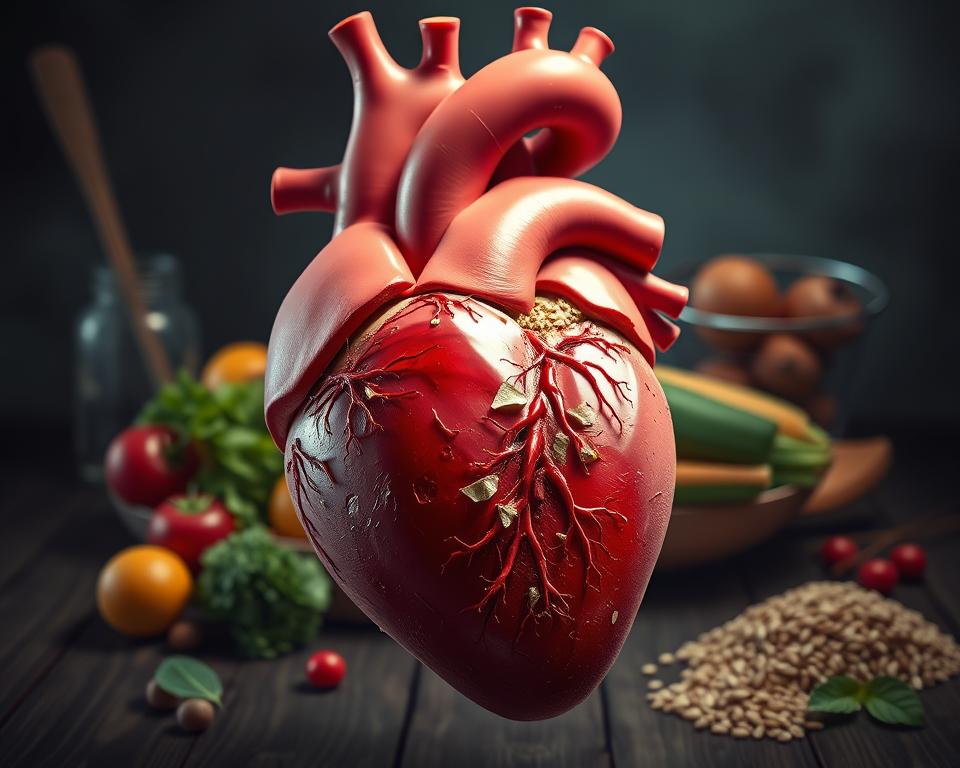High cholesterol is a big risk for heart disease. It affects millions of people. But, changing what you eat can help a lot.
By eating the right foods, you can make your heart healthier. This is especially true for the Mediterranean diet. It’s known for helping lower LDL cholesterol levels naturally.
Choosing the Mediterranean diet is a smart move for your heart. It’s easy to do and can make a big difference. Start making better food choices today for a healthier future.
The Cholesterol Crisis: Why Natural Solutions Matter

Cardiovascular diseases are a big cause of death. High cholesterol is a big risk for heart disease. It affects heart health in many ways.
Understanding the Impact of High Cholesterol on Heart Health
High cholesterol can cause plaque buildup in arteries. This is called atherosclerosis. It can lead to heart attacks or strokes.
It often takes years to develop. Symptoms may not show until it’s too late. Knowing the risks is key to preventing problems.
Key factors influenced by high cholesterol include:
- The narrowing of arteries due to plaque buildup
- Increased risk of heart attack and stroke
- Potential for peripheral artery disease
The Limitations of Medication-Only Approaches
Medicine can help with high cholesterol. But, it doesn’t fix the root cause. Changing your lifestyle is also crucial.
The Mediterranean diet is good for the heart. It lowers LDL cholesterol naturally. It focuses on whole grains, fruits, veggies, and healthy fats.
Using natural solutions and medicine together is best. It helps manage high cholesterol and improves heart health.
What Makes the Mediterranean Diet Effective for Cholesterol Support

The Mediterranean diet is great for heart health and managing cholesterol. It’s full of fruits, veggies, whole grains, and healthy fats. Many studies have shown its benefits for the heart.
The Science Behind the Mediterranean Diet’s Heart Benefits
The diet’s heart benefits come from its nutrients. Monounsaturated fats in olive oil, nuts, and avocados lower bad cholesterol. Whole grains, legumes, and veggies add fiber, helping with cholesterol.
A study in the Journal of the American Medical Association found it lowers heart disease risk.
“The Mediterranean diet is not just a diet, it’s a lifestyle that promotes overall health and well-being.”
This lifestyle is why it works well for cholesterol over time.
Research-Backed Evidence for Cholesterol Reduction
Many studies show the Mediterranean diet lowers LDL cholesterol. A big study in the New England Journal of Medicine found it cuts down on heart problems. This was compared to a low-fat diet.
The diet focuses on whole, nutrient-rich foods. Eating Mediterranean diet foods can improve cholesterol levels for good.
Olive Oil: The Liquid Gold for Heart Health
Olive oil is called ‘liquid gold’ and is key in the Mediterranean diet. It helps keep the heart healthy. Many studies show its benefits against high cholesterol and heart disease.
How Monounsaturated Fats Combat Bad Cholesterol
Olive oil has lots of monounsaturated fats. These fats can lower bad cholesterol. The American Heart Association says they help when you eat less saturated fats.
“The PREDIMED study showed olive oil in a Mediterranean diet lowers heart problems. This proves olive oil is great for the heart,” it found.
Extra Virgin vs. Regular Olive Oil for Cholesterol Management
Choosing the right olive oil is important. Extra virgin olive oil (EVOO) has more antioxidants and polyphenols. These help fight inflammation and support heart health.
While regular olive oil has good fats, EVOO is better for managing cholesterol.
Daily Consumption Guidelines and Cooking Methods
It’s good to eat olive oil in small amounts. Aim for 2-3 tablespoons a day. When cooking, use low to medium heat to keep it healthy.
Using olive oil in dressings or as a finishing touch is also good. This way, you get the most health benefits.
Adding olive oil to your meals and choosing the right type can help your heart. It also helps manage cholesterol levels.
Fiber-Rich Mediterranean Foods That Actively Lower LDL Levels
The Mediterranean diet focuses on whole, fiber-rich foods. This helps manage and lower LDL cholesterol. It includes foods rich in fiber and nutrients for heart health.
Whole Grains and Their Cholesterol-Binding Properties
Whole grains are key in the Mediterranean diet. They are full of dietary fiber. Foods like oats, barley, and whole wheat bread have soluble fiber.
This fiber binds to cholesterol in the digestive system. It stops cholesterol from being absorbed into the blood. Eating whole grains can lower LDL cholesterol. Start your day with oatmeal or use whole-grain bread for sandwiches.
Increasing whole grain consumption is easy. Just add different whole grains to your meals for more benefits.
Legumes: The Overlooked Cholesterol Fighters
Legumes, like beans, lentils, and chickpeas, are also fiber-rich. They are full of soluble fiber and protein. This makes them great for heart health.
Studies show eating legumes lowers LDL cholesterol. This reduces heart disease risk.
“Legumes are a nutritional powerhouse, offering a rich source of fiber, protein, and various essential nutrients that support heart health.”
Fruits and Vegetables with Proven LDL-Lowering Effects
Fruits and vegetables are fiber-rich and full of antioxidants. Berries, apples, and pears have lots of soluble fiber. Leafy greens like spinach and kale have antioxidants that fight heart disease.
The Mediterranean diet suggests eating lots of fruits and vegetables. This maximizes LDL-lowering effects.
To get the most benefits, eat a variety of colorful fruits and vegetables. Try to make half your plate fruits and vegetables during meals.
Omega-3 Rich Fish and Seafood for Improved Lipid Profiles
Omega-3 fatty acids in fatty fish and seafood are key for better cholesterol ratios. The Mediterranean diet focuses on these foods for heart health. Eating omega-3 rich fish and seafood can greatly improve your lipid profiles and heart health.
How Fatty Fish Improves Cholesterol Ratios
Fatty fish like salmon and mackerel have EPA and DHA omega-3s. These help lower triglycerides and improve cholesterol ratios. This can lower heart disease risk. Eating fatty fish can greatly improve your heart health.
Top Mediterranean Fish Choices for Heart Health
The Mediterranean diet suggests several fish and seafood for omega-3s and heart health. Some top picks are:
- Salmon
- Sardines
- Mackerel
- Tuna
These fish are full of omega-3s and add variety to your meals.
Recommended Serving Frequencies and Preparation Methods
Eat fatty fish at least twice a week for heart health. Grilling, baking, or poaching keeps omega-3s intact. Avoid frying to keep health benefits.
Choosing the right fish and seafood can bring lipid profile benefits. You’ll also enjoy the Mediterranean diet’s flavors.
Nuts, Seeds, and Their Powerful Cholesterol-Lowering Effects
Nuts and seeds are key in the Mediterranean diet. They help lower cholesterol. These foods are full of healthy fats, fiber, and antioxidants.
The Research Behind Walnuts and Heart Health
Walnuts are good for the heart. Studies show they can lower bad cholesterol. A study in the Journal of Nutrition found they help lower total and bad cholesterol in people with high cholesterol.
“Walnuts are a rich source of alpha-linolenic acid (ALA), a type of omega-3 fatty acid that has been shown to have anti-inflammatory properties and support heart health.”
Almonds, Pistachios, and Other Mediterranean Nuts
Other nuts like almonds and pistachios are also good for the heart. Almonds have fats that lower bad cholesterol. Pistachios have arginine, which helps blood vessels.
Incorporating Seeds into Your Daily Diet
Seeds like chia and flax are also great for the heart. Chia seeds have omega-3s and fiber. Flaxseeds have ALA. Adding these to meals helps with cholesterol and heart health.
In short, nuts and seeds are tasty and healthy. They help lower cholesterol. Eating a variety of them supports heart health.
Mediterranean Diet for Cholesterol Support: A Complete Weekly Plan
Trying the Mediterranean diet can really help with cholesterol. It includes whole grains, fruits, veggies, and healthy fats. These are great for keeping cholesterol in check.
Breakfast Options That Fight Cholesterol
Begin your day with a Mediterranean breakfast to lower LDL. Try oatmeal with fruits and nuts, or scrambled eggs with spinach and whole-grain toast. These breakfast options are tasty and good for your heart.
Heart-Healthy Lunch and Dinner Ideas
For lunch and dinner, eat lots of veggies, lean proteins, and whole grains. Grilled salmon with veggies and quinoa is a good dinner. A salad with chickpeas, olives, and citrus dressing is a great lunch. These heart-healthy meals help a lot with cholesterol.
Smart Snacking for Cholesterol Management
Snacking can help with cholesterol too. Pick nuts like almonds and walnuts, or eat fruits and veggies with hummus. These snacking options are full of good fats, fiber, and antioxidants.
| Meal | Monday | Tuesday | Wednesday |
|---|---|---|---|
| Breakfast | Oatmeal with banana | Greek yogurt with honey | Avocado toast |
| Lunch | Grilled chicken salad | Lentil soup | Quinoa and vegetable bowl |
| Dinner | Baked salmon | Grilled turkey burger | Vegetable stir-fry |
More Resources on the Mediterranean Diet
For more info and resources on the Mediterranean diet, check out https://the-mediterranean-diet.com. It has lots of recipes, meal plans, and tips for living the Mediterranean way.
Transitioning to a Mediterranean Lifestyle for Long-Term Heart Health
Switching to a Mediterranean lifestyle can really help your heart. It’s about eating better and living healthier. This way, you can keep your heart strong for a long time.
Gradual Changes for Sustainable Results
Changing your life slowly is the best way. Start by eating more fruits, veggies, and whole grains. Then, add more healthy fats like olive oil and nuts.
Try to eat less processed foods and red meat. Instead, choose fish, poultry, and legumes. This will make your heart healthier.
Overcoming Common Challenges When Adopting the Diet
One big challenge is giving up foods you love. Try new recipes with Mediterranean foods. For example, use zucchini noodles instead of pasta and top it with a tomato sauce.
“The Mediterranean diet is not just a diet, it’s a way of living. It’s about enjoying your food, being with family and friends, and having a positive relationship with what you eat.” –
Combining Diet with Other Heart-Healthy Habits
Changing your diet is just the start. You also need to stay active and manage stress. Walking, swimming, and meditation can help a lot.
| Heart-Healthy Habit | Benefits | Tips for Incorporation |
|---|---|---|
| Regular Physical Activity | Improves cardiovascular health, boosts mood | Start with short walks, aim for 30 minutes daily |
| Stress Management | Reduces stress, improves mental health | Try meditation or yoga, even just 10 minutes a day |
| Adequate Sleep | Essential for heart health, overall well-being | Aim for 7-8 hours per night, establish a bedtime routine |
By mixing these habits with the Mediterranean diet, you can greatly improve your heart health. And you’ll feel better overall.
Heart-Healthy Mediterranean Comfort Food Recipes
The Mediterranean diet is more than just healthy eating. It’s about enjoying tasty, heart-healthy meals. It focuses on whole grains, fruits, veggies, and healthy fats. This makes it easy to stay on track while still enjoying your favorite dishes.
Greek Moussaka with a Cholesterol-Friendly Twist
Traditional Greek moussaka is a comfort food favorite. But, it can be made healthier. Use lean ground turkey or beef and low-fat dairy to cut down on saturated fat. Adding more eggplant and whole wheat breadcrumbs boosts fiber, helping lower LDL.
- Use lean ground meat to reduce saturated fat.
- Incorporate plenty of eggplant for fiber and antioxidants.
- Opt for whole wheat breadcrumbs to increase fiber content.
Here’s a simple recipe to get you started:
- Preheat oven to 375°F (190°C).
- Slice eggplant into 1/2-inch thick rounds, brush with olive oil, and bake until tender.
- Cook lean ground meat with onions, garlic, and tomato paste.
- Layer eggplant, meat sauce, and a mixture of low-fat ricotta and Parmesan cheese in a baking dish.
- Top with whole wheat breadcrumbs and bake until golden brown.
Quick Olive Oil and Bean Soup for LDL Reduction
This hearty soup is comforting and full of nutrients for heart health. It has olive oil, beans, and veggies. These add healthy fats, fiber, and antioxidants, making it cholesterol-friendly.
- Saute onions, garlic, and carrots in olive oil.
- Add canned beans, diced tomatoes, and vegetable broth.
- Simmer until the vegetables are tender.
- Season with herbs and serve with a swirl of olive oil.
This soup shows how Mediterranean comfort food can be both nourishing and tasty. It supports a heart-healthy diet.
Conclusion: Your Path to Better Cholesterol Through Mediterranean Eating
Starting the Mediterranean diet is a big step towards better cholesterol and heart health. It helps lower bad cholesterol and makes you feel better overall.
This diet focuses on whole grains, fruits, veggies, and healthy fats like olive oil. Adding omega-3 fish, nuts, and seeds also boosts heart health.
Remember, small changes can make a big difference. Making smart food choices helps your heart stay healthy. You’re on your way to a healthier life.
Get well and stay well, Ray Baker.


